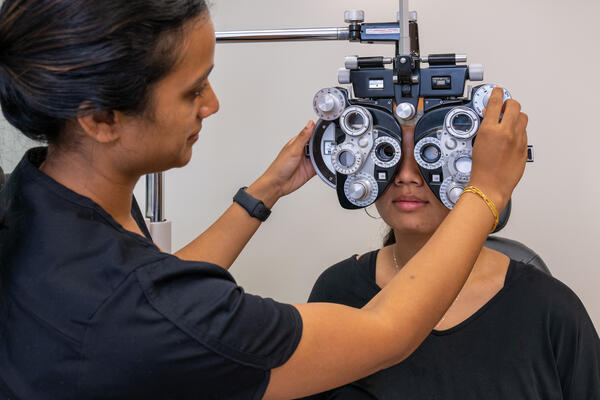Browsing the Puzzle of Refractive Surgeries: Which Procedure Is Right for You?
In the world of refractive surgical procedures aimed at remedying vision, the range of readily available procedures can frequently appear like a labyrinth, each assuring to provide quality and precision. As people consider getting started on the journey in the direction of clearer vision, the essential inquiry occurs: which treatment is certainly the most ideal option?
Recognizing Refractive Surgical Treatment Options

Variables to Take Into Consideration Prior To Selecting
Selecting the most appropriate refractive surgery needs a comprehensive evaluation of numerous factors to make sure optimal results for each individual. Before picking a treatment, several vital considerations need to be taken into account.
Individuals with active way of lives or certain work requirements might profit a lot more from certain procedures. Individuals involved in contact sporting activities might choose for procedures like PRK over LASIK due to the reduced threat of flap difficulties.
Contrasting Popular Vision Modification Procedures
Thinking about the various factors that influence the option of a refractive surgical treatment, it is vital to compare popular vision improvement treatments to figure out the most ideal alternative for private requirements. Two well-known treatments are LASIK (Laser-Assisted in Situ Keratomileusis) and PRK (Photorefractive Keratectomy)
LASIK entails developing a slim flap on the cornea, reshaping the underlying cells with a laser, and afterwards repositioning the flap. It gives fast recovery and minimal pain, with many people experiencing enhanced vision almost promptly. On the other hand, PRK involves eliminating the outer layer of the cornea before reshaping it with a laser. The healing duration is much longer compared to LASIK, PRK is a far better option for individuals with slim corneas or certain corneal abnormalities.
When contrasting these treatments, factors like corneal thickness, eye health and wellness, and desired recovery time should be very carefully taken into consideration. Consulting with an experienced ophthalmologist is vital to establish one of the most suitable procedure based on an individual's specific needs and eye health and wellness condition.
Personalized Therapies for Private Demands
Customizing refractive surgeries to fulfill one-of-a-kind person demands is necessary in accomplishing ideal visual end results and contentment prices. Personalized published here treatments take into consideration private elements such as prescription strength, corneal density, student size, and way of living factors to consider to identify the most ideal procedure for each patient. Advanced modern technologies like wavefront-optimized or wavefront-guided treatments enable doctors to attend to higher-order aberrations and enhance aesthetic high quality past what standard procedures can view publisher site offer.

Locating the Right Cosmetic Surgeon for You
When seeking a surgeon for refractive surgical procedure, it is important to prioritize experience and experience in the area. The specialist you choose will certainly play a significant duty in the success of your procedure and the result of your vision. To find the ideal surgeon for you, think about factors such as their certifications, specialization in refractive surgical treatments, and the variety of procedures they have actually performed.
Begin by looking learn this here now into potential specialists and their qualifications. Search for eye doctors that are board-certified and have particular training in refractive surgical procedure. Additionally, evaluation client testimonies and before-and-after images to gauge the specialist's record of successful outcomes.
Throughout appointments, inquire about the cosmetic surgeon's experience with the particular treatment you are considering. Inquire regarding their difficulty prices, success rates, and how they manage any kind of possible threats associated with the surgery. A proficient and seasoned specialist will certainly not just have the technological experience yet also the ability to customize the treatment to your individual needs, making sure the very best feasible results for your vision adjustment journey.
Final Thought
In final thought, when considering refractive surgical procedures, it is vital to understand the available options, aspects to consider, and the distinctions between preferred procedures. Locating a competent surgeon that can guide you with the maze of options is paramount in making sure an effective vision adjustment treatment.
In the realm of refractive surgical procedures aimed at dealing with vision, the range of readily available procedures can typically appear like a labyrinth, each guaranteeing to offer clearness and accuracy. One common procedure is LASIK (Laser-Assisted in Situ Keratomileusis), where a laser improves the cornea to deal with refractive errors such as farsightedness, nearsightedness, and astigmatism. Custom-made treatments take into account private variables such as prescription toughness, corneal thickness, pupil size, and way of life factors to consider to establish the most suitable procedure for each client. To discover the appropriate surgeon for you, think about variables such as their certifications, expertise in refractive surgical procedures, and the number of procedures they have done.
In final thought, when taking into consideration refractive surgical procedures, it is crucial to understand the available alternatives, aspects to take into consideration, and the distinctions in between prominent procedures. - neurologist Andalusia